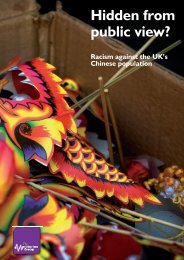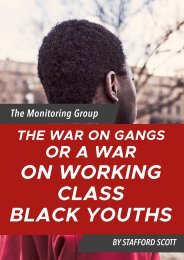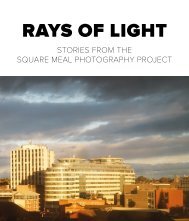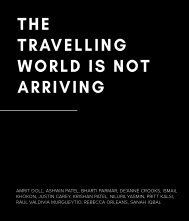Coming of Age : 1976 and the Road to Anti-Racism
Coming of Age : 1976 and the Road to Anti-Racism by Jagdish Patel and Suresh Grover
Coming of Age : 1976 and the Road to Anti-Racism
by Jagdish Patel and Suresh Grover
Create successful ePaper yourself
Turn your PDF publications into a flip-book with our unique Google optimized e-Paper software.
Back <strong>to</strong> India with dreams <strong>of</strong> revolutionary change<br />
In 1973 I went back <strong>to</strong> Ahmedabad on a one-year sabbatical leave from my full time job<br />
as a lecturer at <strong>the</strong> Enfield College <strong>of</strong> Technology, now Middlesex University. The idea was <strong>to</strong><br />
settle in India <strong>and</strong> support <strong>the</strong> emerging Naxalite movement. In Gujarat both CPI <strong>and</strong> CPI (M)<br />
had some presence but not CPI (ML) which had only a h<strong>and</strong>ful <strong>of</strong> sympathisers. Prominent<br />
among <strong>the</strong>se was Kumarbhai, a sexagenarian communist from Kerala running a small trade<br />
union <strong>of</strong> pottery workers who was in contact with one <strong>of</strong> <strong>the</strong> factions <strong>of</strong> <strong>the</strong> Naxalite movement.<br />
I helped him run <strong>the</strong> union <strong>and</strong> also started a Slum Dwellers’ Association <strong>to</strong> protect<br />
slums from demolition by property developers in cahoots with <strong>the</strong> police. I ended up leading<br />
a strike by <strong>the</strong> union <strong>to</strong> get <strong>the</strong> employers <strong>to</strong> implement <strong>the</strong> minimum wage law that had<br />
been made applicable <strong>to</strong> potteries during my stay.<br />
It was a formative experience for me. Families <strong>of</strong> workers on strike had nothing <strong>to</strong> eat<br />
after <strong>the</strong> first week while I continued <strong>to</strong> eat well. Some <strong>of</strong> <strong>the</strong> employers turned out <strong>to</strong> be<br />
from <strong>the</strong> school I had attended; <strong>the</strong>y tried <strong>to</strong> cajole <strong>and</strong> bribe me <strong>to</strong> suspend <strong>the</strong> strike,<br />
failing which <strong>the</strong>y reported me <strong>to</strong> <strong>the</strong> police as a Naxalite. Indira G<strong>and</strong>hi, India’s Prime Minister<br />
at <strong>the</strong> time, had declared Naxalites as <strong>the</strong> ‘single greatest threat <strong>to</strong> India’s security’ <strong>and</strong><br />
sympathisers were being rounded up, imprisoned <strong>and</strong> <strong>to</strong>rtured all over India. When sympa<strong>the</strong>tic<br />
government <strong>of</strong>ficers let it be known <strong>to</strong> my friends that it was advisable for me <strong>to</strong><br />
leave so I returned <strong>to</strong> London <strong>and</strong> joined <strong>the</strong> Central London branch <strong>of</strong> <strong>the</strong> Indian Workers<br />
Association known as IWA (GB).<br />
In 1974 <strong>the</strong> <strong>the</strong>n president <strong>of</strong> <strong>the</strong> Central London branch, Ranjana Ash, a long –st<strong>and</strong>ing<br />
supporter <strong>of</strong> CPI (ML), stepped down <strong>and</strong> I was elected <strong>to</strong> <strong>the</strong> post. In 1975 I bought a house<br />
in East London with my politically active Irish partner but instead <strong>of</strong> working with <strong>the</strong> East<br />
London branch <strong>of</strong> <strong>the</strong> IWA (GB) continued as president <strong>of</strong> <strong>the</strong> Central London branch.<br />
Reasons for joining <strong>the</strong> IWA (GB) in 1973<br />
In a nutshell I joined IWA (GB) because it was run by anti-revisionist, pro-Naxalite Indian<br />
communists. When I returned from India <strong>the</strong>re were two IWAs - IWA (Southall), effectively<br />
confined <strong>to</strong> <strong>the</strong> Southall area only, <strong>and</strong> IWA (GB) with 18 branches. (4 Both organisations<br />
were carrying out welfare work, trade union <strong>and</strong> anti-racist activities as well as international<br />
solidarity campaigns. But <strong>the</strong>re was an important difference in <strong>the</strong> ideology <strong>of</strong> <strong>the</strong>ir leaders.<br />
IWAs led by Association <strong>of</strong> Indian Communists<br />
While all <strong>the</strong> IWA branches were mass organisations open <strong>to</strong> any Indian living in <strong>the</strong> UK,<br />
with a <strong>to</strong>tal <strong>of</strong> 20,000 plus members, each one <strong>of</strong> <strong>the</strong>m was set up <strong>and</strong> run by Indian communists.<br />
On arrival in Britain <strong>the</strong>y had joined <strong>the</strong> Communist Party <strong>of</strong> Great Britain (CPGB), a<br />
150 | <strong>Coming</strong> <strong>of</strong> <strong>Age</strong><br />
<strong>Coming</strong> <strong>of</strong> <strong>Age</strong> Final version 16.10.indd 150 17/10/2017 12:08







